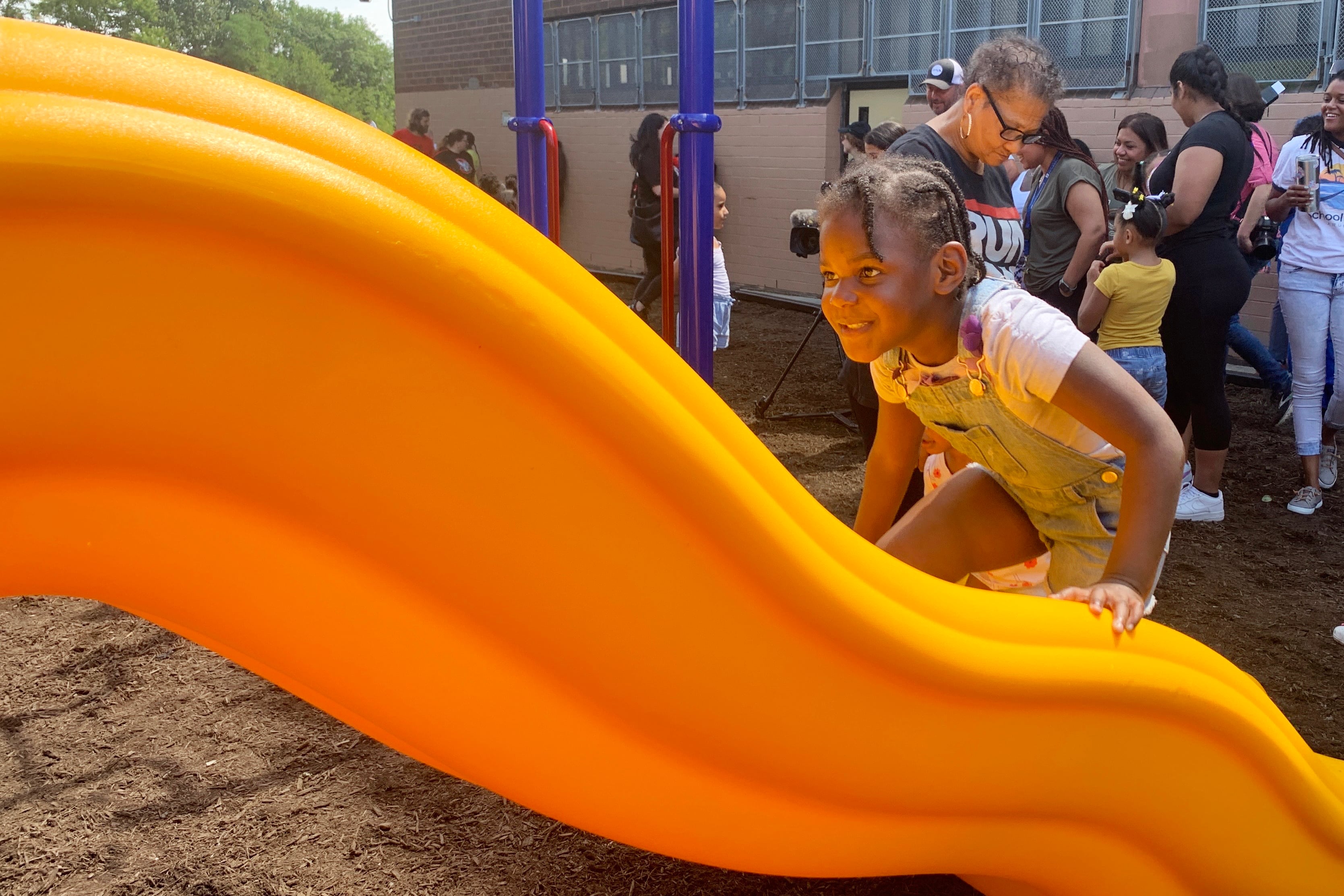Sign up for Chalkbeat Philadelphia’s free newsletter to keep up with the city’s public school system.
When Duane Watts was a student at Edward Steel Elementary School in Philadelphia’s Nicetown neighborhood more than 40 years ago, he remembers running excitedly out of his classroom for recess and being confronted with concrete.
No swings, no slides, no monkey bars to climb on. “We would play tag, but nothing was actually present and given to us to play with,” he said.
But that’s no longer true for the children attending Steel, a pre-K-8 school of more than 300 students. On Thursday morning, school officials and nonprofit leaders cut the ribbon on a new $45,000 playground in Steel’s side yard.
Built over the summer with donated funds, the playground gives children more room to play at a time when policies like the city curfew and restrictions on unaccompanied minors at businesses, as well as gun violence that has affected Nicetown and other Philadelphia neighborhoods, have made it harder for children to congregate and spend productive time together in public spaces.
Teachers and counselors at Steel who fought for the playground by writing grants and building partnerships and community support for it looked on in tears at the ribbon cutting. At least a dozen parents brought their children to be the first to test out the new equipment.
“This is a huge deal for us,” said Nicole Wyglendowski, a special education teacher for K-3 students who helped with the effort. Younger children especially need playgrounds with inviting activities to help them to learn to get along with each other and “just have fun,” she said.
Counselor Maria Lajara, who helped write the grant proposal for the playground with fellow counselor Klarissa Hudson, pointed out most Steel students “don’t really have a nearby city playground that is safe to play in. They want to play, and they didn’t have anything to play with. This is a great asset for them, they deserve that.”
A study in 2019 found that only one third of Philadelphia’s schools had playgrounds, and most of those were in more affluent areas. Advocates have made the case that quality playtime is vital to children’s physical and emotional health, and the lack of playgrounds in some areas of the city has become part of the broader debate about the need for educational equity.
District spokesperson Marissa Orbanek said the situation has improved since then. Of 149 district schools with elementary-age students in the city, 79 have fully equipped playgrounds and 70 don’t, although 11 of those have play equipment in various stages of planning or construction.
The cost of the playground was underwritten by The Block Cares, a two-year-old nonprofit organization with a mission to uplift children; the Robert Half Company, a recruiting firm; and some private donations. The Block Cares is affiliated with The Block Church, a non-denominational Christian congregation founded in 2014.
Maria Little, director at The Block Cares, said her organization has a “mission to empower urban youth and kids to experience a limitless future.” When the organization began working in the Nicetown area, it connected with Steel Elementary and became especially interested in supporting teachers and students as they returned to in-person learning from the pandemic.
Parent Samantha Dowd, who has five children at Steel, had just heard that morning about the playground and the dedication ceremony.
“I was shocked,” she said. “This is really nice. To see something like this is important, especially at a time when so many tragedies are happening,” referring to the gun violence that is plaguing the city.
She was grateful her kids now have a safe space to play. As she spoke, her son Isaac Carter was already on the monkey bars, and her daughters were enjoying the swings. “It’s fun,” Isaac said.
Najalene Bey’s daughter, third grader Amina Ray, made a beeline for the swings as soon as she could. Bey said she had attended Steel herself. When she was a student, they would play sidewalk games like hopscotch, foursquare and jump rope during recess. But surveying the new playground, she said, “I wish we had this.”
Grandmother Darlena Green, watching the children, observed: “They’re not gonna go home now.”
Orbanek said that the district partners with outside organizations for funding what she called “schoolyard transformations.” They include the Eagles Annual Playground Build project and the Trust for Public Land (although not The Block Cares). Grants are provided by the William Penn Foundation, earmarked funds through state legislators, and neighborhood groups connected to schools. (Chalkbeat receives funding from the William Penn Foundation.) The Steel project falls into the latter category.
She noted that the district’s strategic plan includes providing safe, welcoming spaces for students, and that building more playgrounds fits into this.
“We have a vision for our schoolyards to be much more than paved asphalt parking lots,” said Oz Hill, the district’s chief of operations, in a statement. “We strive to provide a dynamic space for playful learning with green space, active recreation, quiet areas, and space to refocus and unwind and creatively engage in learning and socializing through play.”
Watts, who remembers the schoolyard’s concrete during his days as a Steel student, is now the school’s academic teacher leader. After graduating from Dobbins Area Vocational Technical High School and attending college, he went on to a career in finance before switching to education.
He has family members who still live in Nicetown, and he said the neighborhood’s public park is not safe.
“Yeah, this is significant,” he said. “To see this now as a new playground in the area and have it attached to the school that I attended, and the community having access to it, it’s just indescribable.”
Dale Mezzacappa is a senior writer for Chalkbeat Philadelphia, where she covers K-12 schools and early childhood education in Philadelphia. Contact Dale at dmezzacappa@chalkbeat.org.







